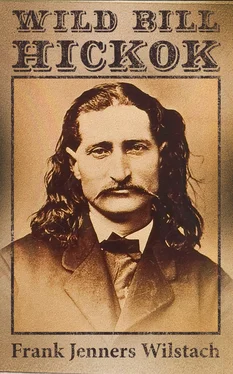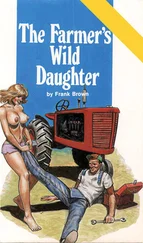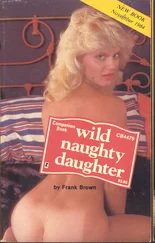Clark Alberti, at this writing an editor in California, was a schoolboy friend of Wild Bill. He wrote lately that “ Wild Bill was one of the greatest men that ever lived.” The present scrivener would hardly go so far as that; his enthusiasm does not mount so high. But looking this way and that, much might be said in favour of Clark Alberti’s far-encircling proclamation. If greatness consists of an unswerving courage, an unquestioned honesty, a gentle and generous spirit, as well as a willingness at all times to endanger one’s life for the sake of public order or to save a friend, then Wild Bill Hickok has a considerable claim to fame. He was, in his time and in his environment, this country’s greatest peace officer. He stood for law and order when there was neither. And as a pistoleer in the presence of bad men running wild, he was the ne plus ultra perfecto .
So much attention has been given to the hectic adventures of this cavalier of the border that little or none has been devoted to his genealogy: as to the why and the wherefore of the man. Acquainted with his stubborn and well-nigh foolhardy courage, none need be surprised to discover that he came of sterling stock. Before making this discovery, the writer felt certain that something of a tonic nature would be revealed when the facts were unearthed. Men of Wild Bill’s verve do not spring from lean and hungry back-alley ancestry.
So, when it was developed that his father, William Alonzo Hickok, was a deacon in the Presbyterian Church, a worthy man of Scotch-Irish ancestry, all our fondest expectations were realized. At once we discovered where Wild Bill inherited his unmitigated devotion to law and order, even to the point of shooting up a town and planting a few worthless carcasses in his own private cemetery.
In the presence of the disorderly, his two ivory-handled Colt’s-45s, resting handily in their holsters, spelled a short-cut to the tomb to any one who revealed disturbing intentions of breaking the peace. While it is not disclosed that the son of the worthy deacon was attentive to his religious duties, we shall see later on that when he assumed the marshalship of any heretofore lawless town he ran it like a church.
We shall now have a little closer look at Wild Bill’s forbears. His father, the worthy William Alonzo Hickok, was born at North Hero, Grand Isle County, Vermont, on December 5,1801. The latter’s father, Otis Hickok, is mentioned as one of the heroes of the battle of Plattsburg during the War of 1812. Otis was one of five brothers who came to America from the north of Ireland.
Young William Alonzo, of a pious rather than a warlike nature, was given a sound education, his parents having designed him for the ministry. Through overwork—although a powerful man—after graduation he was prostrated with brain fever. His recovery was slow and his illness left his mind so impaired that the past was forgotten. Finally his amnesia left him and his memory was restored. Regaining his health he gave up the idea of entering the ministry. In 1827 he married Polly Butler of his native county.
The young couple moved to Broome County, New York, in 1831, where William kept a store. Not thriving according to his expectations he moved in 1834 to Bailey’s Point, Illinois. From there he went to Putnam County, and finally in 1837, to Homer, later called Troy Grove, La Salle County. This hamlet is about seventy miles southwest of Chicago. William Alonzo here opened the first general store at Troy Grove, but the financial crash of 1837 ruined his business prospects. He became a farmer. This worthy and kindly man died in 1852 when his son James was in his fifteenth year.
William A. and his wife, Polly, had six children—four sons and two daughters. Mrs. Louise Hickok, of Troy Grove, has kindly copied from the family Bible the record there set down:
Oliver O. Hickok, b. 1830, d. 1899.
Lorenzo Butler Hickok, b. 1832, d. 1913.
Horace Dewey, b. 1834, d. 1916.
James Butler Hickok [Wild Bill] b. 1837, d. 1876
Celinda, b. 1839, d. 1916.
Lydia, b. 1842, d. 1916.
Wild Bill’s mother, Polly, born in 1804, died in 1878 at Troy Grove, two years after her celebrated son had been assassinated.
In his early youth, Wild Bill disclosed a marked fondness for firearms. It is revealed by those who knew him in his childhood, that when he was eight years old he traded some cherished possessions for a single-barrelled pistol, the fondest desire of his heart. It was a flint-lock, and regarded by him as priceless. He somehow obtained powder and bullets and then began his first experience in marksmanship, in which he finally attained an amazing proficiency.
When he was fourteen years old, he secured an excellent pistol and a short time thereafter his father presented him with a first-class rifle. From that day he spent the greater part of his time in the woods. At this period the neighbourhood was greatly annoyed by the ravages of wolves, to such an extrent, in fact, that the state offered a premium for the scalps. The boy became a hunter of wolves, with the result that each evening he returned home with a belt full of scalps which were converted into cash at the end of each month.
Some surprise has been expressed by certain worthy folks that young Bill now decided to fare forth into the wilds, imagining that his failure to stay at Troy Grove was owing to some perversity of character. Any man child who does not understand the absurdity of this supposition proves that he has never been a Boy Scout and knows naught of the lure of the woods. Bill’s father had travelled by wagon more than a thousand miles to seek a home on the prairie, and why should his son not do likewise?
The magic of the setting sun in that day was in the blood of every man and boy. Those who remained behind longed to be on the move. That a boy with an adventurous spirit should meditate hanging up his hat for good in Troy Grove is not at all likely.
The question of what to do and where to go must have tormented our hero not a little. Every village boy, even at this day, is confronted by a similar problem, and if he has romance ana adventure in him, he will find a way of escape. If Wild Bill had had any notion of gaining a settled, humdrum living in a town—a clerkship, or something equally moilsome—he might well have set his heart on Chicago, only a short distance away, and then a thriving town which had been incorporated two years before he obtained his first firearms.
We learn from Wild Bill’s school friends that the boys of Troy Grove were much the same as others of that period. Mark Twain was a boy of the same era, living at no great distance away in Missouri. All the boys of that day were agog with stories of the plains, of shooting and trapping, of Indians, of free life in the open, something that has ever appealed to youth.
For such a lad as Wild Bill, Troy Grove must have been deplorably irksome. His brother, Lorenzo, did go on the plains for a time, but returned to become a surveyor; Oliver was a famous owner and driver of trotting horses—the trainer and driver of the greatest trotter of his day, St. Julian; Horace was a justice of the peace, while James, without disclosing any particular accomplishments, sallied forth to develop into the frontier’s most famous celebrity.
The opportunities for gaining an education in rural Illinois at that period were meagre. Yet, with such schooling as he was able to acquire, and under his mother’s own tutelage, the boy managed to gain, according to all accounts, a rudimentary education. Horace A. Hickok, the son of Wild Bill’s brother Horace, states that his father had told him that “his brother James never started a quarrel; was always good-tempered; was a bright and apt pupil and never behind his schoolmates.”
There were not many books to be obtained in those parts, but we are told that he managed, at the age of fifteen, to lay hands on copies of Peters’s “Life of Kit Carson” and of “The Trapper’s Guide.” These books made such a profound impression on his mind that, in later years, he told a friend he then and there said to his brothers, “One day I’ll beat anything that Kit Carson ever did or attempted.”
Читать дальше












